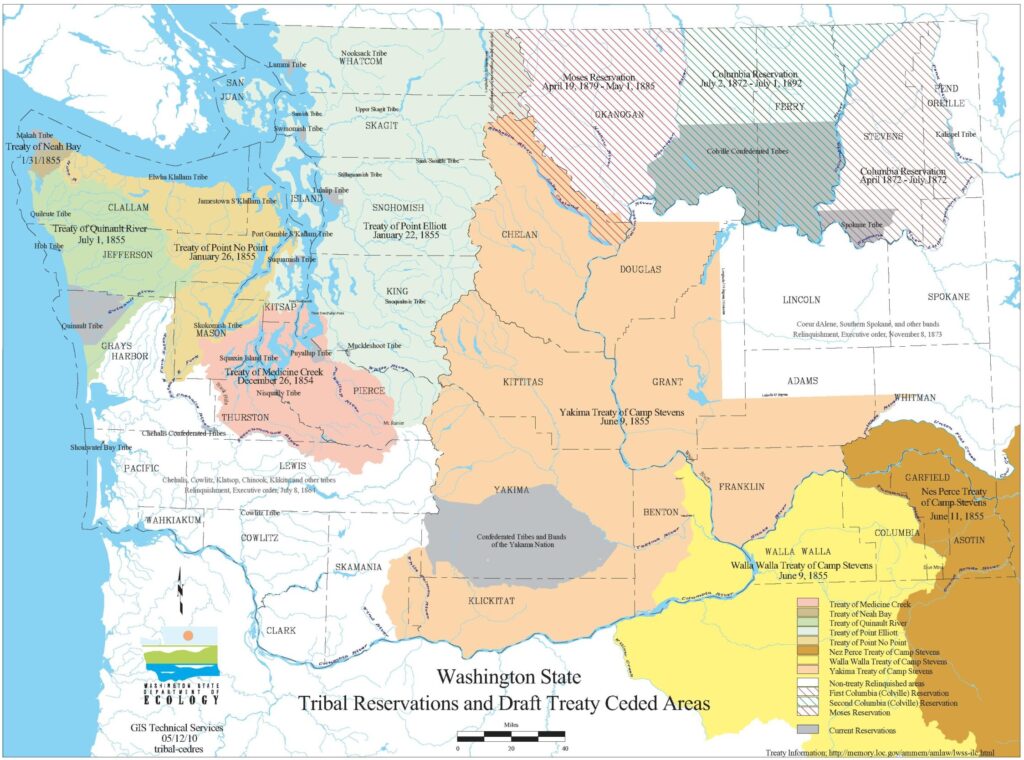Tribal Planning Coordination for GMA
This tribal planning coordination page contains information on new changes to the Growth Management Act (GMA) implementing HB 1717 (2022).

Background
Tribal Engagement is an overarching term that encompasses all levels of tribal communication and partnership, from informal coordination to formal government-to-government consultation. Federally recognized tribes retain their rights as sovereign nations to a direct government-to-government relationship with the federal government, independent of the state or local jurisdictions. Tribal Sovereignty is a legal term that means the right of a people to self-govern within jurisdictional borders. According to Washington Tribes, “Tribal sovereignty recognizes that American Indian tribes have the political status of nations and that Indian nations are located within the territorial boundaries of the United States. As sovereigns, tribal nations have a government-to-government relationship with the two other sovereign governing bodies in the U.S. — the federal and state governments.”
At Commerce, we engage with tribes in a few different ways including:
- Archaeological and historical project reviews
- Informal tribal coordination
- Informal tribal consultation
- Formal government-to-government consultation
Local Governments and Tribes
For local governments, tribal engagement can be conducted at a level of tribal coordination — informal engagement with tribal communities through conversations focused on information sharing with tribal staff. Tribal coordination also includes working with Indigenous groups that are not tribal governments, such as urban Native American organizations and/or tribal populations not located in their Indian Country. This might include non-federally recognized tribes, Native American non-profits and Indigenous community-based organizations. It is important to understand the distinction between working with federally recognized tribes who are self-governing sovereign nations and other Native American groups.
Your jurisdiction should reach out to tribes that have reservation lands, ancestral lands and waters, and/or “usual and accustomed areas” that neighbor your jurisdiction. Local governments have a legal responsibility to uphold sovereignty and treaty rights by consulting with tribal governments to reach consensus. Consider how you can approach this in a culturally appropriate manner by learning about your neighboring tribes through research, talking to mutual contacts, and visits to cultural heritage centers.
Key information about Washington’s tribal governments and their reservations can be found online at the Governor’s Office of Indian Affairs: www.goia.wa.gov.
New Requirements under the GMA - HB 1717 (2022)
- RCW 36.70A.040 – Allows tribes to voluntarily participate in the local governments’ comprehensive planning process.
- RCW 36.70A.085 – Cities with a Port element must collaborate development with the city, port, and tribe(s).
- RCW 36.70A.106 – Requires Commerce to share submittals with tribes. Tribes will indicate Commerce which jurisdiction’s submissions will be transmitted.
- RCW 36.70A.110 – Requires local jurisdictions to work with tribes to coordinate urban growth. Tribes must opt-in to coordinate with the jurisdiction.
- RCW 36.70A.190 – Requires Commerce to provide facilitation services. Federally recognized tribes may request assistance from Commerce to resolve issues related to proposed changes to local comprehensive plans and development regulations.
- RCW 26.70A.210 – Requires counties to invite tribes to participate in developing countywide planning policies. Counties must develop policies for the protection of tribal cultural resources in collaboration with tribes if they choose to participate.
Many tribes have their own comprehensive plans that have a climate resilience element, and expertise developing climate adaptation plans. Collaborative planning efforts may help identify mutual priority actions and strategies that can inform neighboring jurisdictions. Tribes may choose to participate in your formal process for comprehensive planning, or in any other formal or informal way they choose. If tribes decline to participate due to capacity constraints or any other issue, your jurisdiction should still share updates and invite input throughout the planning process. Tribal involvement in local government comprehensive planning is evolving and additional guidance is being developed to accompany recent updates to Growth Management Act through HB 1717.
Tribal Reservations and Draft Treaty Ceded Areas in Washington
Washington State Tribes by County
Resources
State resources for tribal planning
- Washington State Department of Commerce PlanView
- Governor’s Office of Indian Affairs
- Washington State Treaties
- Federally Recognized Tribes
- Washington State Department of Archaeology and Historic Preservation
- Washington State Department of Fish & Wildlife
- Washington State Department of Transportation Tribal Contacts
- Washington State Department of Ecology’s Map of Tribal lands in Washington (PDF)
- Washington State Department of Ecology’s Map of Tribes and Reservations within Washington (PDF)
- Puget Sound Regional Council Coordination with Tribes in Comprehensive Planning (PDF)
Quick Links
- Growth Management
- Governor's Smart Communities Awards
- Climate Program
- Planning for Housing
- Laws and Rules - Growth Management Act
- Periodic Updates - Growth Management Act
- Growth Management Grants
- Growth Management Topics
- Guidebooks and Resources
- Civilian-Military Compatibility
- Defense Community Compatibility
- Ecosystem Services Program
- Regional Planners' Forums
- Short Course on Local Planning
- Submitting Materials to the State
- Tribal Planning Coordination
Contact
Bridget Ray, Tribal Coordination Manager
Bridget.Ray@commerce.wa.gov
Cell: 564-201-0294
Commerce Tribal Liaisons


